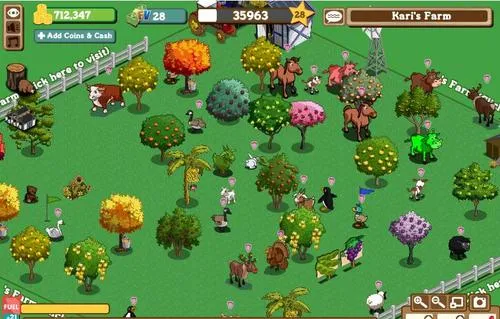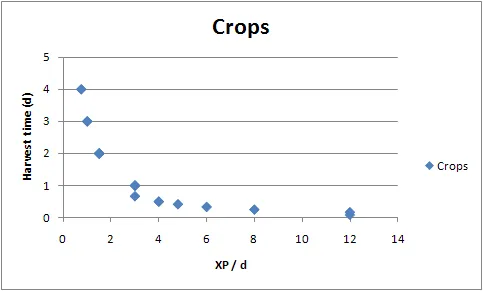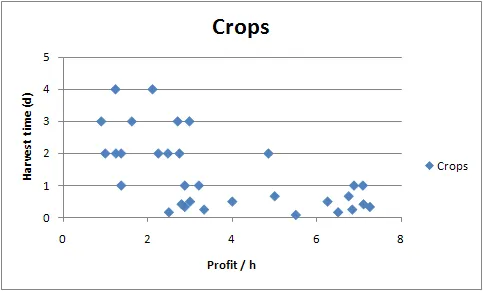FarmVille - the Casual RPG
In my opinion, FarmVille is a role playing game (RPG). And pretty bad one at that. Like most social RPGs, you don’t actually need any skills or develop any skill playing it yourself as your success is solely dependent on the amount of time you sink into it. You can get pretty good at FreeCell, but no matter how much time you spend in FarmVille, you won’t get “better” in it.
However, what most RPGs have at least is a story – even if most these days have left their ending pretty open. One could even argue that the genre has the strongest stories in games. Contrast this to FarmVille which isn’t trying to tell you any story. In this sense it resembles a simulation, but that genre is usually characterized by depth and strategy which are nowhere to be seen in FarmVille, unlike, say, in SimFarm from 1993.

It is way too easy to categorise FarmVille as a “casual” game, but “casual” doesn’t need to mean games where you can’t lose, games which have zero learning curve and games that don’t offer challenge. A good example of “casual” game that always ends in the player “losing” and (hence?) offers a lot of challenge is Bejeweled. If I remember correctly, Bejeweled was the previous title holder to the biggest casual game ever.
The only challenges are achievements – and now collections. But there’s little, if any, social value in achieving them – unless you count boasting about them on your Facebook wall. And, unfortunately, the game doesn’t have level 13 Pig Warlocks.
There’s some irony that the main reason people play FarmVille, boredom, is also a main reason why people quit it. This boredom kicks in at about level 20 or so, where you start to realize that you have pretty much seen everything the game has to offer. The only thing left is the grind.
There are, of course, shortcuts to simple grinding. You can use farm machinery to do your activities faster, but they consume fuel (that, until recently, you could only refill by real money). Also, spending money allows you to get many benefits before non-paying players. And this is a problem, because many people don’t consider this “fair”. Offering players to pay to save time, however, is pretty crucial from business logic. The trap here is that the players who don’t feel comfortable paying start to feel that the only way to progress in the game is to spend real money.
FarmVille follows the RPG formula that the higher you have leveled, the more effort (ie. experience points) you need to reach next level. Granted, you have access to new things that might increase your “productivity”, but the mean time between levels is increasing. However, and this is the problem, the reward of leveling up remains pretty much the same. At some point, the perceieved benefit/effort ratio falls short. The trick is that at this point, the player has invested so much into the game that they might be more willing to pay real money to make advancing easier… if the rewards of leveling up are worth it.
The business logic of FarmVille dictates that the more you play, the better player you are for Zynga. It’s the curious logic of taxing your good customers, the discrimination for the information age. This is most evident if you look at how the experience points you get from crops depends on their harvest time. The shorter the harvest time (and so, how many times the player “needs” to play FarmVille), the more experience the player can gain in given time. As you can see, the relationship between these two variables follows an exponential distribution with pretty high correlation.

Harvest time is strongly correlated with experience points you can get in FarmVille

There’s not much correlation between profits and harvest time, though.
As an interesting side note, the correlation between Harvest time and profit isn’t nearly as high and there’s a lot of variation. This neatly illustrates how the main metric in the game (from game designer’s perspective) is not profit, but experience points which are tightly tied to player retention. This also means that while there’s a wide variety of different kind of crops, there’s only a handful that makes any sense to use as the rest are strongly dominated. Oh, and the trees and the animals don’t make any sense given how scarce the land is and how much more profitable the crops are. The only reason to have either is for achieving ribbons – or self-expression (which you might have already guessed was pretty low on my priority list).
The other thing in FarmVille is that your game progress is also aided somewhat by the amount of friends you have. Whether these friends help you or not, is not necessasry, as only retaining a certain friend amount gives you benefits. The most important of these is access to larger farms. The social aspects of FarmVille can be divided into self-expression (how one designs one’s farm) and a coordination game of sharing gifts and other “loot”. The game design trick of “free gifts” is pretty clear after the player realizes that he or she needs a bigger farm to accommodate all the gifts. Contrast this “social gaming” to the title-holder of “most anti-social game ever”, World of Warcraft, in which (as far as I’ve understood) it is possible to “complete” the game alone, but playing with others is a key element to enjoy the game. In WoW the higher level players can help out lower level players, but in FarmVille the higher level players can gift some items to lower level players that lower player level players can’t gift. So, for some time the reciprocity logic didn’t really work in gifting, but this was recently fixed by introduction of “Mystery gifts” that are pretty much the only thing that makes sense for lower level players to send to higher level players.
So, what you are left in a more competitive sense of “social gaming” is the amount of ribbons you have collected, the level you have achieved and how pimped out your farm is. The element of achievements that you can accomplish as a group is zero.
I’m not entirely sure that Facebook is the most fertily grounds for games, as the dominating functionality seems to be “the social” and exploiting one’s userbase. Game mechanics and social dynamics come second. This is why I believe that to experience “true” social gaming, one needs to invest some real money to buy a game. The “free” gaming model seems to denigrate too quickly into nickel-and-diming, see for example what happened with EA’s Battlefield Heroes – where again some of the players didn’t see the real money elements as “fair” after certain point.
The problem with FarmVille, in short, is that the business logic dictates the game design too much. The revenue incentives of Zynga make the game experience worse for the players, who are looking for more than just killing time.
This article originally appeared on Tech IT Easy on February 5, 2010.